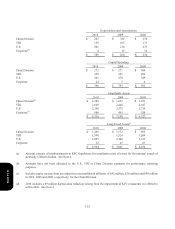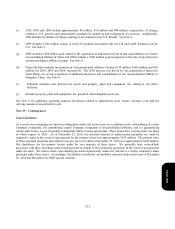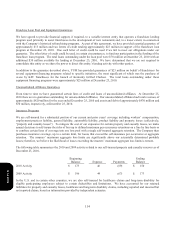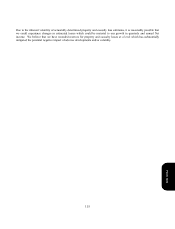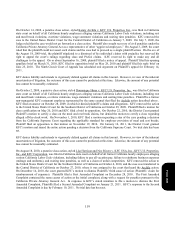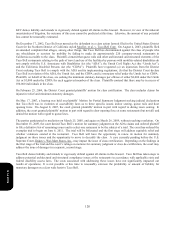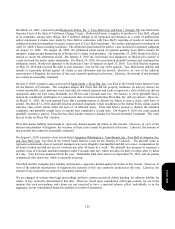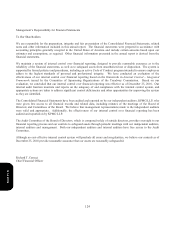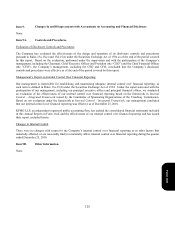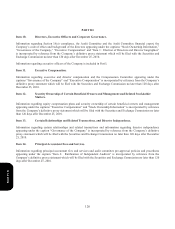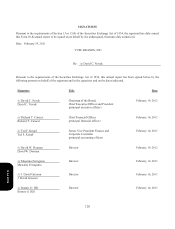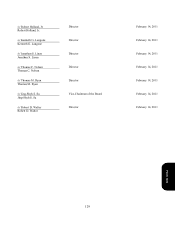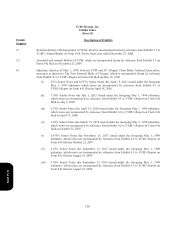Pizza Hut 2010 Annual Report Download - page 217
Download and view the complete annual report
Please find page 217 of the 2010 Pizza Hut annual report below. You can navigate through the pages in the report by either clicking on the pages listed below, or by using the keyword search tool below to find specific information within the annual report.
120
KFC denies liability and intends to vigorously defend against all claims in this lawsuit. However, in view of the inherent
uncertainties of litigation, the outcome of this case cannot be predicted at this time. Likewise, the amount of any potential
loss cannot be reasonably estimated.
On December 17, 2002, Taco Bell was named as the defendant in a class action lawsuit filed in the United States District
Court for the Northern District of California styled Moeller, et al. v. Taco Bell Corp. On August 4, 2003, plaintiffs filed
an amended complaint that alleges, among other things, that Taco Bell has discriminated against the class of people who
use wheelchairs or scooters for mobility by failing to make its approximately 220 company-owned restaurants in
California accessible to the class. Plaintiffs contend that queue rails and other architectural and structural elements of the
Taco Bell restaurants relating to the path of travel and use of the facilities by persons with mobility-related disabilities do
not comply with the U.S. Americans with Disabilities Act (the “ADA”), the Unruh Civil Rights Act (the “Unruh Act”),
and the California Disabled Persons Act (the “CDPA”). Plaintiffs have requested: (a) an injunction from the District
Court ordering Taco Bell to comply with the ADA and its implementing regulations; (b) that the District Court declare
Taco Bell in violation of the ADA, the Unruh Act, and the CDPA; and (c) monetary relief under the Unruh Act or CDPA.
Plaintiffs, on behalf of the class, are seeking the minimum statutory damages per offense of either $4,000 under the Unruh
Act or $1,000 under the CDPA for each aggrieved member of the class. Plaintiffs contend that there may be in excess of
100,000 individuals in the class.
On February 23, 2004, the District Court granted plaintiffs’ motion for class certification. The class includes claims for
injunctive relief and minimum statutory damages.
On May 17, 2007, a hearing was held on plaintiffs’ Motion for Partial Summary Judgment seeking judicial declaration
that Taco Bell was in violation of accessibility laws as to three specific issues: indoor seating, queue rails and door
opening force. On August 8, 2007, the court granted plaintiffs’ motion in part with regard to dining room seating. In
addition, the court granted plaintiffs’ motion in part with regard to door opening force at some restaurants (but not all) and
denied the motion with regard to queue lines.
The parties participated in mediation on March 25, 2008, and again on March 26, 2009, without reaching resolution. On
December 16, 2009, the court denied Taco Bell’s motion for summary judgment on the ADA claims and ordered plaintiff
to file a definitive list of remaining issues and to select one restaurant to be the subject of a trial. The court has ordered the
exemplar trial to begin on June 6, 2011. The trial will be bifurcated and the first stage will address equitable relief and
whether violations existed at the restaurant. Taco Bell will have the opportunity to renew its motion for summary
judgment on those issues and the opportunity to move to decertify the class. A case currently pending before the U.S.
Supreme Court, Dukes v. Wal-Mart Stores, Inc., may impact the issue of class certification. Depending on the findings in
the first stage of the trial and the court’s rulings on motions for summary judgment or class de-certification, the court may
address the issue of damages in a separate, second stage.
Taco Bell denies liability and intends to vigorously defend against all claims in this lawsuit. Taco Bell has taken steps to
address potential architectural and structural compliance issues at the restaurants in accordance with applicable state and
federal disability access laws. The costs associated with addressing these issues have not significantly impacted our
results of operations. It is not possible at this time to reasonably estimate the probability or amount of liability for
monetary damages on a class wide basis to Taco Bell.
Form 10-K




